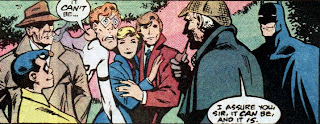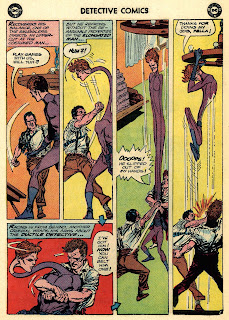Here's my perception of Ralph's personality:
| Vigilant | 61% |
| Solitary | 32% |
| Idiosyncratic | 70% |
| Adventurous | 77% |
| Mercurial | 8% |
| Dramatic | 21% |
| Self - Confident | 79% |
| Sensitive | 27% |
| Devoted | 58% |
| Concientous | 61% |
| Leisurely | 58% |
| Aggressive | 50% |
| Self - Sacrificing | 22% |
And here's why...
Like most of the characters in serial fiction, the Elongated Man's personality has suffered changes throughout time. As faithful as some can be, every writer has a different vision of the character. Even his fans have different perceptions of the ductile detective.
In his first six adventures, John Broome portrayed him as a superhero with an odd behavior. There wasn't much to his personality, only that he was a little more easy going that Flash (who was an easy going superhero himself). Neither of them gave the overly dramatic/heroic speeches that Batman or Superman use to give. Additionally, Ralph was eclectic and creative in his decisions. He didn't have a base operations, used his super powers to make a fortune, got married (which wasn't common for superheroes at the time) and gave up his secret identity.
Even though his dialogue is plain in these early appearances, his actions speak plenty for him. His temperament is established as primordially sanguine and secondarily phlegmatic. He's laid back and a great entertainer; he's rarely angered and always open minded and optimistic. His actions are bold and he is a success magnet: first, he arrives to Central City and, as a rookie, he overshadows the fastest man alive in his own game; he still becomes Flash's best friend; then, he becomes a showman and makes a fortune in a sec, retires, marries Sue Dearbon, a beautiful heiress, and starts to travel the World with her on a perpetual honeymoon. This extreme path of success follows them the rest of their adventures, throughout the 70s, 80s and 90s, they become intimate friends of the most powerful people in the DCU, he is awarded membership of it's most powerful superteam team (12th member and one of the longest staying) and he did all of that almost effortlessly and while having fun. Not to mention that she becomes a talented hacker, Bureau Chief of the Justice League Europe and a best selling mystery writer. It's a canon fact that Ralph Dibny takes the best in life and is very serious about enjoying every bit of it. However, he's very methodical and diligent.
During this period a mild enthusiasm for mysteries start.
 |
| Ralph begins to be portrayed as a detective in Flash #138, his 7th appearance. |
Nora and Nick Charles, the main influence on the Dibnys.
 |
| The begining or Ralph's clowning. |
During the 80s there was some exploration. When Batman retired from the JLA, writer Gerry Conway made Ralph the idea guy of the team; casually stating his deductions and suggesting plans of action. Meanwhile, Mike W. Barr proposed that his sense of humor was a defense mechanism to avoid thinking about the tragedy of the cases he often took. He also defined Ralph as a detective fiction expert, to the point that he was a World authority on Sherlock Holmes literature.
 |
| The Elongated Man meets his idol, the Great Detective. |
In the late 80s, Gerard Jones, Mark Waid, J. M. DeMatteis and Keith Giffen accentuated him as a guy who loves attention, even if it takes slapstick humor and self deprecating jokes to get it. This is the way he remained during the 90s. In the early Justice League Europe stories, Giffen and DeMatteis had him as a witty guy who joked with his wife but also encouraged and appreciated her talent, they also explored his relationship with Wally West, the current Flash and the former sidekick of his best friend; when DeMatteis was replaced with Jones, the character development stopped and when Giffen left, he became an inept clown, by far, the worst and most destruct destructive portrayal of the character. My theory is that it ruined the character for other writers during the rest of the 90s.
 |
| Ralph portrayed as a really goofy character. |
In 2003, Giffen and DeMatteis took away the slapstick and went back to witty humor with his wife, echoing their Thin Man influences.
His appearances in Justice League Unlimited was very similar to it.
Brad Meltzer made a serious and thoughtful sketch of Ralph as a person and husband in Identity Crisis and then, in 52, after the death of Sue, Mark Waid and Grant Morrison turned him into a more serious and detective. Both stories portrayed him as a really sharp detective, very similar to Sherlock Holmes in his method.
 |
| Ralph's portrayal in Identity Crisis #1. |
Now, from what I perceive, fans of the Elongated Man share a common vision of the way he should be portrayed. We all seem to agree that, as Barr, Meltzer and Waid portrayed him, he's primordially a detective. I think that he should keep what I consider his two biggest influences Nick Charles and Sherlock Holmes. Since his first Detective Comics story, he became the type of sleuth that can make great deductions from observing details in scenes or people. Identity Crisis indicated that he's able to memorize all those details even under great stress. New stories should focus on this. Check it out, it can be really cool:
Despite his sanguine temperament, he's very methodical and diligent. He does stuff like memorizing details about people and scenes and he's rarely late or stressed by work, all trademarks of phlegmatic people. It wouldn't be a bad idea for the next writer to expand on his habits. I bet he dedicates part of every day to activities like practicing his memory skills, training his body, spending time with Sue, reading the news and, as Barr established, some detective fiction classics. Regarding his physical skills, the brightest observation I have ever heard from another fan is that he is likely to spend time every day on them. Training his body to get the most out of his super stretching: controlling mass, balance, shape, strength. Even his senses must be affected by this. Around the satellite era, he started to shapeshift to change his face, by the JLI era, he was able to create a bulldog head out of his hand.
There is also the matter of the extent of his super power. I has never been said, but the way he often made his hands huge and lifted men with each imply that he has super strength. Bigger hands don't have more mass, just the same mass in a bigger volume, which means less strength. An ability that has been mentioned but is not that famous is the speed of his stretching; some stories mention that he can reach dozens of feet within a fraction of a second, other show him using his knuckles or his chin as projectiles that knock out villains, which indicate an enormous speed and strength. Something that rare writers explore are the possibilities implied by stretching, like tuning his senses so that he could see, hear and smell beyond normal human capabilities. If he can stretch his chest and head cavities, he can basically produce any sound. He's also able to resist and absorb great impacts (he once stopped a truck). He has used his body as a rubber band (even serving as a bow for Green Arrow) and he can become thin as a sheet; in theory, this means that he can project himself into the air and then control his shape to navigate the wind (That's when he's not using his arms to move across the buildings like Spider-man).
When it comes to his sense of humor, consensus seems to indicate that it is a trademark that is should be kept. However, there are certain aspects from it that don't work. Here, Plastic Man is often used as a point of reference. He also became a big joker in the late 80s, only he was even bigger on slapstick; so it's commonly said that Ralph is like Jerry Seinfeld while Plas is more like Jerry Lewis (or Jim Carrey). Personally, given his profession, I think Ralph should have the observational humor of Seinfeld but with the quick wit of David Spade and maybe with the cultural references of Dennis Miller (EM strikes me as the kind of guy that pays a lot of attention to the news). Maybe a bit of Conan O'Brian's playfulnes wouldn't be so far from the Nick Charles mold. He's not the type that would make mean jokes about other people, but I can definitely can see him making "that's a shame" kind of comments about the goofiness of some of his friends.
I believe that a thoughtful portrayal that works expanding the trademarks that Gardner Fox, Mike Barr, Gerry Conway, Keith Giffen, J. M. DeMatteis, Brad Meltzer and Mark Waid left would make him a more solid DC character. Writers just need to use Ralph and Sue's rich profiles in classic detective fiction formulas (with the superhero twist, of course). They just need to do with him what TV has already done with characters like Nick Charles, Columbo, Jessica Fletcher, Poirot, Monk, Murdoch, Shawn Spencer or Patrick Jane. Cold open, crime scene investigation, a series of interviews revealing clues to the readers, intercalated comic relief shenanigans, reconstruction of events, climactic chase and epilogue or denuement (usually the regular characters solve their mild conflict of the day).


















